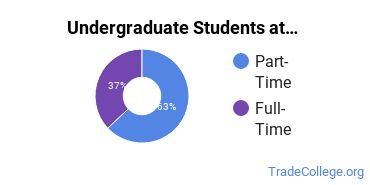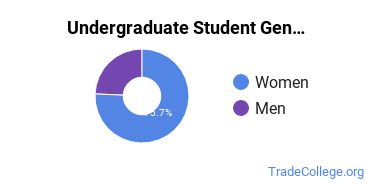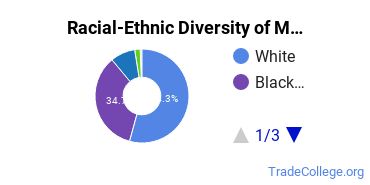Find Trade Colleges
Martin Community College Trade Programs
Martin Community College is a public institution situated in Williamston, North Carolina. Williamston is a good match for students who enjoy small-town life.
Featured schools near , edit
Where Is Martin Community College?

Contact details for Martin Community College are given below.
| Contact Details | |
|---|---|
| Address: | 1161 Kehukee Pk Rd, Williamston, NC 27892-9988 |
| Phone: | 252-792-1521 |
| Website: | www.martincc.edu |
Can I Afford Martin Community College?
| In State | Out of State | |
|---|---|---|
| Tuition | $2,432 | $8,576 |
| Fees | $91 | $91 |
| Books and Supplies | $1,500 | $1,500 |
Martin Community College Undergraduate Student Diversity

Gender Diversity
Of the 221 full-time undergraduates at Martin Community College, 30% are male and 70% are female.

Racial-Ethnic Diversity
The racial-ethnic breakdown of Martin Community College students is as follows.

| Race/Ethnicity | Number of Grads |
|---|---|
| Asian | 1 |
| Black or African American | 75 |
| Hispanic or Latino | 1 |
| White | 118 |
| International Students | 0 |
| Other Races/Ethnicities | 26 |
Martin Community College Trade School Concentrations
The table below shows the number of awards for each concentration.
| Major | Basic Certificate | Associate’s | Undergraduate Certificate | TOTAL |
|---|---|---|---|---|
| Welding Technology/Welder | 26 | 0 | 1 | 27 |
| Medical/Clinical Assistant | 16 | 4 | 0 | 20 |
| Medical Office Management/Administration | 14 | 3 | 1 | 18 |
| Physical Therapy Assistant | 0 | 14 | 0 | 14 |
| Heating, Air Conditioning, Ventilation & Refrigeration Maintenance Technology/Technician | 5 | 6 | 3 | 14 |
| Other Electromechanical & Instrumentation & Maintenance Technologies/Technicians | 8 | 2 | 2 | 12 |
| Electrician | 5 | 5 | 0 | 10 |
| Dental Assisting/Assistant | 0 | 0 | 9 | 9 |
| Automobile/Automotive Mechanics Technology/Technician | 8 | 1 | 0 | 9 |
| Orthopedic Technology | 7 | 0 | 0 | 7 |
| General Cosmetology/Cosmetologist | 2 | 0 | 2 | 4 |
| Applied Engineering Technologies | 1 | 1 | 1 | 3 |
| Nail Technician/Specialist & Manicurist | 0 | 0 | 0 | 0 |
| TOTAL | 92 | 36 | 19 | 147 |
References
*The racial-ethnic minorities count is calculated by taking the total number of students and subtracting white students, international students, and students whose race/ethnicity was unknown. This number is then divided by the total number of students at the school to obtain the racial-ethnic minorities percentage.
More about our data sources and methodologies.
